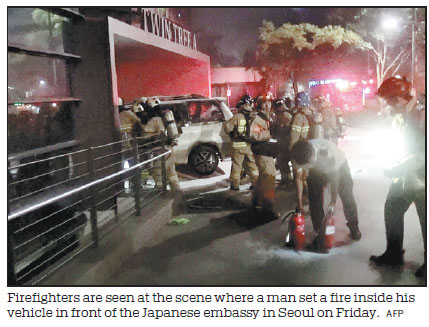Japan, S. Korea trade words over forced labor
TOKYO/SEOUL - Japanese Foreign Minister Taro Kono summoned South Korea's ambassador to Tokyo on Friday, in a deepening diplomatic row over compensation for Korean wartime forced labor that threatens global supply of memory chips and display screens.
The dispute took a tragic turn earlier on Friday when a South Korean man in his 70s set himself on fire around 3:20 am in front of the Japanese embassy in Seoul in an apparent protest. Officials said the man was in a critical condition. His father-in-law was said to be a victim of forced labor by Japanese firms during World War II.
South Korean Ambassador to Japan Nam Gwan-pyo was summoned to meet Kono a day after the midnight deadline set by Japan for South Korea to accept third-country arbitration of the forced labor dispute passed.
South Korea has rejected third-country arbitration and Kono said Seoul must take swift measures to correct what Japan says was an improper ruling last year by South Korea's Supreme Court ordering two Japanese firms to compensate the wartime workers.
Japan says the issue of compensation was settled under a 1965 treaty which established diplomatic relations between the two nations following World War II.
"What the South Korean government is doing now is equivalent to subverting the post-World War Two international order," Kono said at the start of the meeting.
Nam responded that South Korea was working every day to create an environment where the lawsuits could be dealt with in a way that would be acceptable to both sides and not harm bilateral ties.
The two diplomats exchanged testy remarks in front of reporters, with Kono interrupting when Nam said South Korea had already proposed a plan to resolve the issue.
"Hold on," Kono said. "We've already told the South Korean side the South Korean proposal was totally unacceptable, and that is not something that would redress the situation where international law is violated. It is extremely impertinent to propose it again by pretending to not know that."
Neither official specified what that plan was, but last month Japan rejected a South Korean proposal to form a joint fund with Japan to compensate South Korean plaintiffs.
Agencies - Xinhua

(China Daily 07/20/2019 page8)














